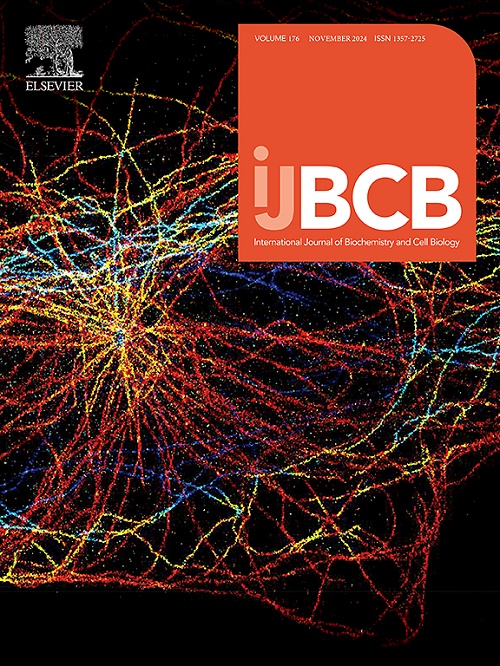局部使用肽离子液体偶联物促进糖尿病小鼠伤口愈合
IF 2.8
3区 生物学
Q2 BIOCHEMISTRY & MOLECULAR BIOLOGY
International Journal of Biochemistry & Cell Biology
Pub Date : 2025-02-14
DOI:10.1016/j.biocel.2025.106753
引用次数: 0
摘要
糖尿病足溃疡(DFU)是糖尿病最严重的并发症之一,严重影响患者的生活质量。在最糟糕的情况下,DFU可能导致严重的截肢甚至死亡。DFU是微生物病原体的一个容易的靶点,它们的有效愈合受到微生物对抗生素耐药性急剧增加的阻碍,包括DFU中最常见的病原体,如金黄色葡萄球菌。因此,现有抗生素对DFU的治疗效果较差,导致慢性疾病,由于持续炎症,缺氧和血管生成低,愈合率低而加剧,导致缺血的高风险,以及其他通常影响糖尿病患者的疾病。我们的团队最近设计了新的基于肽的局部治疗DFU的策略,肽离子液体偶联物成为非常有前途的药物。C16-Im-PP4是最好的这种偶联物之一,它是将具有固有抗菌活性的咪唑基离子液体偶联到化妆品中使用的胶原蛋白促进肽的n端,即五肽-4。C16-Im-PP4对人真皮成纤维细胞具有广谱抗菌作用和促胶原作用等优异的体外特性,促进了本文的体内研究。将肽离子液体偶联物局部应用于糖尿病小鼠创面。结果显示,1 µg/伤口剂量下的多靶点作用包括:i)抗炎;(二)抗氧化;3) pro-collagenic;(六)pro-angiogenic;v)抗菌素;改善创面成熟效果。总之,这些结果确定该技术是一种新的局部治疗DFU。本文章由计算机程序翻译,如有差异,请以英文原文为准。
Enhancement of wound healing in diabetic mice by topical use of a peptide-ionic liquid conjugate
Diabetic foot ulcers (DFU) are one of the most devastating complications of diabetes, with high impact on patient’s quality of life. In worst scenarios, DFU can lead to severe amputation or even death. DFUs are an easy target for microbial pathogens and their effective healing is hampered by the galloping increase of microbial resistance to antibiotics, including from the most prevalent pathogens in DFU, e.g. Staphylococcus aureus. As such, available antibiotics show poor efficacy in the treatment of DFU, leading to a chronic condition that is exacerbated by poor healing rates due to the persistent inflammation, poor oxygenation and low angiogenesis, leading to high risk of ischemia, among other conditions that typically affect patients with diabetes. Our group has recently designed new peptide-based strategies towards the topical treatment of DFU, whereby peptide-ionic liquid conjugates emerged as highly promising agents. One of the best such conjugates, C16-Im-PP4, results from coupling an imidazolium-based ionic liquid with intrinsic antimicrobial activity to the N-terminus of a collagen boosting peptide used in cosmetics, the pentapeptide-4. C16-Im-PP4 showed excellent in vitro properties, namely, wide-spectrum antimicrobial action and collagen-boosting effect on human dermal fibroblasts, prompting the in vivo study here reported. The peptide-ionic liquid conjugate was applied topically on wounds of mice with diabetes. The results show multitargeted actions, at a dose of 1 µg/wound including: i) anti-inflammatory; ii) antioxidant; iii) pro-collagenic; vi) pro-angiogenic; v) antimicrobial; and vi) improved wound maturation effects. Altogether, these results identify this technology as a novel topical treatment for DFU.
求助全文
通过发布文献求助,成功后即可免费获取论文全文。
去求助
来源期刊
CiteScore
8.10
自引率
0.00%
发文量
124
审稿时长
19 days
期刊介绍:
IJBCB publishes original research articles, invited reviews and in-focus articles in all areas of cell and molecular biology and biomedical research.
Topics of interest include, but are not limited to:
-Mechanistic studies of cells, cell organelles, sub-cellular molecular pathways and metabolism
-Novel insights into disease pathogenesis
-Nanotechnology with implication to biological and medical processes
-Genomics and bioinformatics

 求助内容:
求助内容: 应助结果提醒方式:
应助结果提醒方式:


